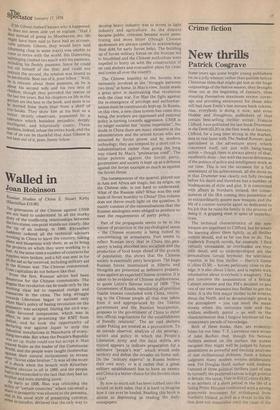Walled in
°an Robinson Russian Studies of China E. Stuart Kirby (Macmillan £10.00) The grievances of the Chinese against USSR are not hard to understand. In all the murky story of the conflicting relationships betweenthe two states, one point stands out clearly, like ,the tip of an iceberg; in 1960, Khruschev „„ —"AnenlY ordered all the technical advisers Working in China to leave the country, taking Plans and blueprints with them, so as to bring ,the Projects on which they were working to a nalt. At the same time a number of contracts for supplies were broken, and a bill was sent in for all the aid so far received, including military aid in the Korean war. The Chinese commented: Even capitalists do not behave like that. From the first, Russian advice had been „isastrous for the Chinese communists. The dog that revolution crnn be made only by the Working class led to repeated risings and massacres in the cities. The long struggle towards Liberation began to succeed only When Mao's policy of basing revolution on the Peasantrywas accepted. During the civil war, Stalin favoured compromise, which was in effect to aim at protecting the KMT from defeat, and he took the opportunity of declaring war against Japan to strip the industrial installations in Manchuria of everything movable. But when the People's Republic treat set up, Stalin could not but accept it. Mao
C„aed Stalin as the leader of the Communist World and the people were taught (somewhat
awtainst their natural inclinations) to revere
their "Soviet elder brother." It was all the more a shock when the breach with Kruschev
had obvious to all in 1960, and the people brother to be reconciled to the fact that they had no urother and were standing alone. As early as 1956, Mao was criticising the Policy of "certain countries" where too small a Share in prosperity was allowed to the peasants. sel in his usual style of presenting common se as paradox, declared that the only way to
develop heavy industry was to invest in light industry and agriculture. As the dispute became public, criticism became more penetrating and more bitter (though Chinese spokesmen are always careful to acknowledge their debt for early Soviet help). The building up of Soviet military forces on the frontier led to bloodshed and the Chinese authorities were impelled to hurry on with the construction of air raid shelters and evacuation plans for cities and towns all over the country.
The Chinese hostility to the Soviets was intimately involved in the "struggle between two lines" at home. In Mao's view, Stalin made a great error in maintaining that revolution ends the class war. For Mao the fight against the re-emergence Of privilege and authoritarianism must be continuously kept up. In Russia, on this view, a new class system has come into being, the workers are oppressed and national policy is turning towards aggression. USSR is. no longer socialist but "social imperialist". No doubt in China there are many elements in the administration and the armed forces who are attracted by Soviet power and by modern technology; they are tempted by a short cut to industrialisation rather than going the long way round by Mao's "proletarian road". The bitter polemic against the Soviet party, government and society is kept up as a defence against the Soviet example as much as against the Soviet threat.
The consequences of the quarrel, played out in Asia and Africa are tragic, but its origin, on the Chinese side, is not hard to understand. What of the Russian side? What was the real basis of Soviet hostility to China? This volume does not throw much light on the question. It mainly consists of the rationalisations that the Russian sinologists were obliged to produce to meet the requirements of party policy.
Part of the propaganda seems to be in the nature of projection in the psychological sense — the Chinese economy is being ruined by concentrating on armaments. Part seems to reflect Russian envy that in China the peasantry is being absorbed into socialism and the production of food keeps ahead of the growth of population; this shows that the Chinese society is essentially petty bourgeois. The huge Russian forces maintained in Siberia and Mongolia are presented as defensive preparations against an expected Chinese invasion. It is taken to be evidence of Chinese stubbornness, to quote Lenin's famous note of 1920: "The Government of Russia, repudiating all previous Tsarist treaties concluded with China, returning to the Chinese people all that was taken from it and appropriated by the Tsarist government and the Russian bourgeoisie, proposes to the government of China to enter into official negotiations for the establishment of friendly relations". The air raid shelters under Peking are treated as a provocation. To an outside observer, ahalysiS of the strategy, tactics and policy in which the People's Liberation Army and the local militia are trained appears to indicate preparation for a defensive "people's war" which would cede territory and defeat the invader on home soil. Do the "military experts" in Russia believe their own story, or is it rather that a great military establishment has to have an enemy and China is a better choice for the Soviets than USA?
By now so much salt has been rubbed into the wound on both sides, that it is hard to imagine how it can ever be healed. Reading this book is almost as depressing as reading the daily hewspapers.


























 Previous page
Previous page